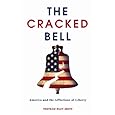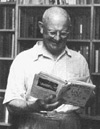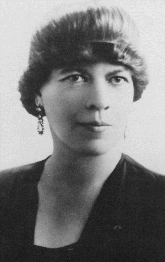Saturday, 29 October 2016
Sunday, 11 August 2013
The Custom of the Country
Posted by
Celia
at
10:21
0
comments
![]()
Labels: Books
Saturday, 10 August 2013
Something's Wrong by Sam Smith
Sam Smith's books here: http://samsmithbooks.weebly.com/
Posted by
Celia
at
20:41
2
comments
![]()
Labels: Books
Thursday, 29 December 2011
Proust (re-visited) via Hesperus Press
Of course, if you have never even dipped your toe into A La Recherche Du Temps Perdu, whether in French or in translation, that last remark won’t mean much to you, but Pleasures and and Days will give you an authentic introduction to the Proustian style and themes so that, who knows?- you may be tempted to launch forth on the great work itself!
From Pleasures and Days:
"It's the ship leaving for India" said Jean Galeas.
As I read those words, I was haunted by echoes of Theophile Gautiere’s poem, L’Isle Inconnu, memorably set to music by Berlioz:
Dites, la jeune belle,
Où voulez-vous aller?
La voile enfle son aile,
La brise va souffler.
L’aviron est d’ivoire,
Le pavillon de moire,
Le gouvernail d’or fin.
J’ai pour lest une orange,
Pour voile une aile d’ange,
Pour mousse un séraphin.
Dites, la jeune belle,
Où voulez-vous aller?
La voile enfle son aile,
La brise va souffler.
Est-ce dans la Baltique?
Dans la mer Pacifique?
Dans l’île de Java?
Ou bien est-ce en Norvège,
Cueillir la fleur de neige,
Ou la fleur d’Angsoka?
Dites, la jeune belle,
Cette rive, ma chère,
On ne la connaît guère
Au pays des amours.
Posted by
Celia
at
12:03
1 comments
![]()
Labels: Books
Tuesday, 13 December 2011
The Cracked Bell. America and the Afflictions of Liberty
by Tristram Riley-Smith
http://www.thecrackedbell.com/
Posted by
Celia
at
21:40
1 comments
![]()
Labels: Books
Wednesday, 14 April 2010
The Woman who died of Robespierre
A Life of Solitude
Stanislawa Przybyszewska
A Biographical Study with Selected Letters
by Jadwig Kousack and Daniel Gerould
Please don't ask me how 'Przybyszewska' is pronounced - I have no idea! But the life-story of this gifted Polish writer is as fascinating as it is appalling. What's more, learning about her passion, amounting to an obsession, with Robespierre led me to some internet explorations and information about the French Revolution, of which my knowledge is extremely, and shamefully, meagre.
Przbyszewska's obsession with Robespierre, Danton and the French Revolution in general took root at a young age. Hilary Mantel, writing in the London Review of Books (Vol.22 No. 7 20th March 2000), says this of her:
Posted by
Celia
at
17:07
1 comments
![]()
Labels: Books
Wednesday, 30 April 2008
Savage Messiah by H.S.Ede
 ‘When I face the beauty of nature, I am no longer sensitive to art, but in the town I appreciate its myriad benefits—the more I go into the woods and the fields the more distrustful I become of art and wish all civilization to the devil; the more I wander about amidst filth and sweat the better I understand art and love it; the desire for it becomes my crying need.’ Henri Gaudier-Brzeska
‘When I face the beauty of nature, I am no longer sensitive to art, but in the town I appreciate its myriad benefits—the more I go into the woods and the fields the more distrustful I become of art and wish all civilization to the devil; the more I wander about amidst filth and sweat the better I understand art and love it; the desire for it becomes my crying need.’ Henri Gaudier-BrzeskaJ.S.Ede’s book is based largely on Henri’s letters, mainly those to Sophie Brzeska but including some to family and friends, which Ede obtained from Sophie’s estate after her death in 1925. Henri and Sophie’s intense and complex relationship, begun when he was eighteen and she over twice his age, must surely rank as one of the most interesting and enigmatic in the annals of human relationships. Their symbiotic interdependence was so complete that he ‘annexed’ her name to his own and thereafter was known as Henri Gaudier-Brzeska. In their relationship, ostensibly platonic, the roles of mother-and-child/brother-and sister/loving friends were played out endlessly, yet expressed, always, in the most passionately loving terms.
Henri’s letters detail his everyday concerns and activities, intimately interwoven with his work and artistic development. He and Sophie lived together and supported each other through periods of the direst poverty and deprivation. When they were apart, most often because of illness or, in Sophie’s case, the need to earn money, for example as a governess, they constantly exchanged letters although Sophie’s to Henri seem not to have survived.
Henri was killed in the trenches at the start of the First World War. Sophie never recovered from this loss and died in an asylum in 1925.

I haven’t seen Ken Russell’s 1972 film based on Ede’s book.
Posted by
Celia
at
15:52
0
comments
![]()
Labels: Books
Wednesday, 26 March 2008
P.G.Wodehouse A Life by Robert McCrum
Posted by
Celia
at
21:33
1 comments
![]()
Labels: Books
Thursday, 3 January 2008
Samuel Beckett on Proust (1931)
 "There is no escape from yesterday because yesterday has deformed us, or been deformed by us. The word is of no importance. Deformation has taken place. Yesterday is not a milestone which has been passed, but a daystone on the beaten track of the years, and irremediably part of us, within us, heavy and dangerous. We are not merely more weary because of yesterday, we are other, no longer what we were before the calamity of yesterday." (P13)
"There is no escape from yesterday because yesterday has deformed us, or been deformed by us. The word is of no importance. Deformation has taken place. Yesterday is not a milestone which has been passed, but a daystone on the beaten track of the years, and irremediably part of us, within us, heavy and dangerous. We are not merely more weary because of yesterday, we are other, no longer what we were before the calamity of yesterday." (P13)
"The aspirations of yesterday were valid for yesterday's ego, not for today's. We are disappointed at the nullity of what we were pleased to call attainment. But what is attainment? The identification of the subject with the object of his desire. The subject has died - and perhaps many times - on the way. (P13f)
"Voluntary memory (Proust repeats it ad nauseam) is of no value as an instrument of evocation, and provides an image as far removed from the real as the myth of our imagination or the caricature furnished by direct perception. There is only one real impression and one adequate mode of evocation. Over neither have we the least control." (P14)
"But involuntary memory is an unruly magician and will not be importuned. It chooses its own time and place for the performance of its miracle. I do not know how many times this miracle recurs in Proust. I think twelve or thirteen times. But the first - the famous episode of the madeleine steeped in tea - would justify the assertion that his entire book is a monument to involuntary memory and the epic of its action. The whole of Proust's world comes out of a teacup....."(P34)
On Page 54, quoting Proust: 'How can we have the courage to wish to live, how can we make a movement to preserve ourselves from death, in a world where love is provoked by a lie and consists solely in the need of having one's suffering appeased by whatever being has made us suffer.?' (Proust, of course, is at this point dwelling on his painful and labyrinthine relationship with Albertine.)
Posted by
Celia
at
20:44
1 comments
![]()
Labels: Books
Sunday, 30 December 2007
A Suitcase
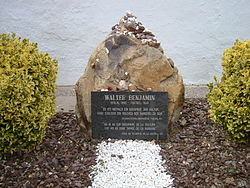 From Nobody’s Home
From Nobody’s Home
Essays by Dubravka Ugresic
A Suitcase
‘There are authors who have penned marvellous pages on exile. They unwittingly polish the subject, and in doing so give exile the glow of a romantic rebellion against the demands of everyday life, a rejection of home and homeland for the thrill of personal freedom. The people who have written these pages overlook the banalities; Walter Benjamin killed himself because he wasn't able to get his papers stamped; everything might have turned out differently had that anonymous clerk stamped Benjamin's passport. But in myths, including ones about exile, everyone is inclined to forget the anonymous bureaucrats. And this is how the bold face of clerkish triviality, shored up by both the author’s, and the reader's, romantic expectations, becomes the face of cruel Destiny.’
‘Literature tends to show the romantic side of exile. In reality, people live in exile submerged in trauma. The image of exile suggests a rebellious fragmentation, but also a servile obedience to the process of acquiring a new home. The only way those in exile are able to leave it behind is not to leave it behind at all, but to live it as a permanent state, to turn their waiting room into a cheery ideology of life, and to embrace the schizophrenia of exile as the norm of normalcy, revering only one god: the suitcase!’
‘The most intimate side of exile is tied to luggage. As I write these lines I am surrounded by a dozen kinds: bags, suitcases (with and without wheels), costly valises, cheap duffels, all purchased in various cities. I look at them fondly: they are my only true companions, witnesses to my wanderings. The suitcases travel, go across borders, move in and move out with me……..’
Posted by
Celia
at
18:08
0
comments
![]()
Labels: Books
Friday, 21 September 2007
Francis Ponge (1899-1988)
Francis Ponge French essayist/poet, who often combined the two forms to create a sort of prose poetry.
Quoting from Wikipaedia:
‘In his most famous work, Le parti pris des choses (Often translated The Voice of Things), he meticulously described common things such as oranges, potatoes and cigarettes in a poetic voice, but with a personal style and paragraph form (prose poem) much like an essay. These poems owe much to the work of the French Renaissance poet Remy Belleau. Ponge avoided appeals to emotion and symbolism, and instead sought to minutely recreate the world of experience of everyday objects. His work is often associated with the philosophy of Phenomenology.
He described his own works as "a description-definition-literary artwork" which avoided both the drabness of a dictionary and the inadequacy of poetry.’
Only one of his works could be discovered on the shelves here: Le Grand Recueil (subtitle Pieces). It is the original Gallimard edition of 1961 and has a soft, foxed paper cover. It is printed on equally soft, thick pages, some of which remain uncut. Sorry to say, my rusty French is no longer up to translating without recourse to a dictionary. Even worse, the On-line French dictionary claims that many of the words in the following ‘Symphonie Pastorale’ do not exist!
Symphonie Pastorale
Aux deux tiers de la hauteur du volet gauche de la fenetre, un nid de chants d’oiseaux, une pelote de cris d’oiseaux, une pelote de pepiments, une glande gargouillante cridoisogene,
Tandis qu’un lamellibranche la barre en tracers,
(Le tout envelope du floconnement adipeux d’un ciel nuageux)
Et que la borborygme des crapauds fait le bruit des entrailles,
Le coucou bat regulierement comme le bruit du coeur dans le lointoin.
Fortunately, http://www.kalin.lm.com/ponge.html has some examples of Ponge’s writings in translation:
Rhetoric
I assume we are talking about saving a few young men from suicide. I have in mind those who commit suicide out of disgust, because they find that others own too large a share of them. To them one should say: at least let the minority within you have the right to speak. Be poets. They will answer: but it is especially there, it is always there that I feel others within me; when I try to express myself, I am unable to do so. Words are readymade and express themselves: they do not express me. Once again I find myself suffocating. At that moment, teaching the art of resisting words becomes useful, the art of saying only what one wants to say, the art of doing them violence, of forcing them to submit. In short... Found a rhetoric, or rather, teach everyone the art of founding his own rhetoric. This saves those few, those rare individuals who must be saved: those who are aware, and who are troubled and disgusted by the others within the, those individuals who make the mind progress, and who are, strictly speaking, capable of changing the reality of things.
the pleasures of the door
Kings do not touch doors.
They do not know that happiness: to push before them with kindness or rudeness one of these great familiar panels, to turn around towards it to put it back in place - to hold it in one's arms.
... The happiness of grabbing by the porcelain knot of its belly one of these huge single obstacles; this quick grappling by which, for a moment, progress is hindered, as the eye opens and the entire body fits into its new environment.
With a friendly hand he holds it a while longer before pushing it back decidedly thus shutting himself in - of which, he, by the click of the powerful and well-oiled spring, is pleasantly assured.
On the above website I also find some words of Ponge translated by Peter Riley. http://www.kalin.lm.com/water.html
Posted by
Celia
at
11:04
3
comments
![]()
Labels: Books
Monday, 30 July 2007
The Curtain

The Curtain by Milan Kundera (2005)
‘…human life as such is a defeat. All we can do in the face of that ineluctable defeat called life is to try to understand it. That – that is the raison d’etre of the art of the novel.’
Described as An Essay in Seven Parts, this book is Kundera’s personal view of the history and value of the novel in Western civilization. ‘The curtain’ is the ready-made perception of the world which we all inherit – a pre-interpreted world. It is the function of the novelist to tear down this curtain to reveal to us something which we didn’t know. For anyone who reads as many novels as I do this book is salutary.
A novel which glorifies the conventional or the hackneyed ‘excludes itself from the history of the novel.’ Only by tearing through the curtain of pre-interpretation can a novel be worthy of its name – ‘It is the identifying sign of the art of the novel.’
‘For life is short, reading is long, and literature is in the process of killing itself off through an insane proliferation. Every novelist, starting with his own work, should eliminate whatever is secondary, lay out for himself and everyone else the ethic of the essential.’
‘It [the novel] refuses to exist as an illustration of a historical era, as description of society, as defense of an ideology, and instead puts itself exclusively at the service of what only the novel can say.’
Posted by
Celia
at
19:15
2
comments
![]()
Labels: Books
Monday, 23 July 2007
Darkness and Day (1951)
The New York Herald Tribune said: "Her specialty is a kind of surgical operation upon family life. Through her, we see it startlingly stripped of its more amiable pretensions. Parents and children, servants and masters, engage in a queer kind of verbal warfare bristling with innuendo and even with a candor that slashes to the quick. Her revelation of character ... [is] built upon a searching yet serene anlysis of the egotisms, envies, irascibilities that are part of domestic intercourse. By reason of her accurate avoidance of all pretense or idealism, her people actually become ... almost heroic, and vividly if bitterly funny."
Raymond Mortimer, reviewing Darkness and Day in the Sunday Times, wrote:
"Everyone in it [Darkness and Day] is either protecting himself from the truth or unearthing it. 'What we ought to be is not what we are.' If all the characters blaze with wit, this is in order to illuminate the most unlovely recesses of the human heart; in none of the fashionable prophets of despair do we find a blacker view of human nature. Yet here the reader is exhilarated — by the author's iron courage and by her austere diction, which can rise to poetic grandeur ..."
Opinion on Ivy Compton Burnett’s work has been divided, some claiming that she is a literary genius, others that she is unreadably pretentious.
"The most original novelist now writing in English", said V.S Pritchett, and Philip Toynbee commented: "Miss Compton-Burnett is totally unlike any other novelist. Wit and melodrama have never been so combined before, and the combination is a brilliant success.... She is a unique figure in modern English literature."
—
On the other hand, John o' London's Weekly, reviewing More Women Than Men described it as: "Pompous falsity ... a pinnacle of unreality", and reviewing Men and Wives, the New Statesman said:
"There is something rather cruel, rather horrible in Miss Burnett's talent."
There’s a wealth of information about ICB on the Internet – you could start with Wikipedia: http://en.wikipedia.org/wiki/Ivy_Compton-Burnett
Posted by
Celia
at
20:07
0
comments
![]()
Labels: Books
Sunday, 22 July 2007
Slightly Foxed

In this issue, I particularly enjoyed Sue Gee's piece about Kathleen Hale, one of my favourite children's authors. The review of James Hamilton-Paterson's Griefwork (see my previous Blog on this book) by Tim Longville was as lively in tone and as original and perceptive in comment as I'd expect from him.
Posted by
Celia
at
19:11
0
comments
![]()
Labels: Books
Saturday, 30 June 2007
The Twilight of American Culture
 The Twilight of American Culture by Morris Berman. (2000)
The Twilight of American Culture by Morris Berman. (2000)
Berman is, of course, writing specifically about America, but his argument has universal relevance.
Posted by
Celia
at
19:05
1 comments
![]()
Labels: Books
Saturday, 23 June 2007
Barbara Kingsolver

Prodigal Summer by Barbara Kingsolver. Another member of my library reading group gave me this book, by a writer I'd never heard of. But I'm very glad she did - it's a remarkable book, combining Kingsolver's experience as a scientist, and her very obvious passion for the natural world, with an engaging narrative style.
Here’s a Synopsis and comment, taken from an on-line review: ‘Prodigal Summer weaves together three stories of human love within a larger tapestry of lives inhabiting the forested mountains and struggling small farms of southern Appalachia. At the heart of these intertwined narratives is a den of coyotes that have recently migrated into the region. Deanna Wolfe, a reclusive wildlife biologist, watches the forest from her outpost in an isolated mountain cabin where she is caught off-guard by Eddie Bondo, a young hunter who comes to invade her most private spaces and confound her self-assured, solitary life. On a farm several miles down the mountain, another web of lives unfolds as Lusa Maluf Landowski, a bookish city girl turned farmer's wife, finds herself unexpectedly marooned in a strange place where she must declare or lose her attachment to the land. And a few more miles down the road, a pair of elderly, feuding neighbors tend their respective farms and wrangle about God, pesticides, and the complexities of a world neither of them expected.
Kingsolver writes as well, and as convincingly, about the human characters in her narrative as she does about the natural world and the creatures who inhabit it. Her theme is the interconnectedness, both of the humans and natural world they inhabit.Over the course of one humid summer, as the urge to procreate overtakes a green and profligate countryside, these characters find connections to one another and to the flora and fauna with which they necessarily share a place. Their discoveries are embedded inside countless intimate lessons of biology, the realities of small farming, and the final, urgent truth that humans are only one part of life on earth.’
Posted by
Celia
at
16:56
0
comments
![]()
Labels: Books
Monday, 18 June 2007
The Spell of the Sensuous
The Spell of the Sensuous by David Abram (1996) Subtilted: Perception and Language in a More-Than-Human-World.
In his book (his only book as far as I can find out) Abram, a philospher and accomplished sleight-of-hand magician, describes the intimate relations between traditional magicians of many cultures, and the natural world which surrounds them. He then explores language and its power to 'enhance or stifle the spontaneous life of the senses.'
In the Preface he argues that 'Today we participate almost exclusively with other humans and our own human-made technologies. It is a precarious situation, given our age-old reciprocity with the many-voiced landscape. We still NEED that which is other than ourselves and our own creations.'
It is not his premise that we should renounce our modern technologies, but rather that we 'must renew our acquaintance with the sensuous world in which our techniques and technologies are rooted.'
Anyone who has lived long enough to remember a time when in our daily lives we still recognised our dependence on the natural world will be touched, and troubled, by Abram's message that 'Direct sensuous reality, in all its more-than-human mystery, remains the sole solid touchstone for an experiential world now inundated with electronically-generated vistas; only in regular contact with the tangible ground and sky can we learn how to orient and to navigate in the multiple dimensions that now claim us.'
Reading that, I was reminded of a recent survey undertaken with kids, which revealed that many of them didn't know that there was any connection between cows and milk, or that carrots grew in the earth!
Posted by
Celia
at
19:52
6
comments
![]()
Labels: Books
Friday, 15 June 2007
Invisible Cities
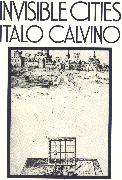
From Invisible Cities (1972) by Italo Calvino:
Kublai Khan says: I do not know when you have had time to visit all the countries you describe. It seems to me you have never moved from this garden.
Marco Polo replies thus: Everything I see and do assumes meaning in a mental space where the same calm reigns as here, the same penumbra, the same silence streaked by the rustling of leaves. At the moment when I concentrate and reflect, I find myself again, always, in this garden, at this hour of evening, in your august presence, though I continue without a moments pause, moving up a river green with crocodiles or counting the barrels of salted fish being lowered into the hold.
You could consider Invisible Cities in several ways: as a series of linked stories on a single theme, or as a sort of prose poem, or even as a continuous narrative. One reviewer suggests that this book was designed to be dipped into rather than read through, also that it is perhaps not the best of Calvino’s books to start with. I was at a disadvantage on both counts. I read it straight through at 3 in the morning about two weeks ago and have been slightly troubled, indeed haunted, by it ever since.
Gore Vidal, writing in The New York Review of Books commented: "Of all tasks, describing the contents of a book is the most difficult and in the case of a marvelous invention like Invisible Cities, perfectly irrelevant."
I fear this is true, but will try nonetheless to give sufficient of a flavour to (maybe) entice some more readers to give it a go.
Invisible Cities describes imaginary conversations between Marco Polo and Kublai Khan. The Great Khan wishes to hear reports about his vast empires, which it is beyond his ability to visit himself. Marco Polo describes his visits to a series of surreal cities in the Khan's domain, each city being characterized by a unique quality or concept and each one given a name which is evocatively feminine. Cities are categorized under headings as, for example, Cities and Memory, Cities and Signs, Cities and Names, Cities and the Dead….It is for the reader (along with Kublai Khan!) to read significance into Marco Polo's fragmented tales, to puzzle over the metaphorical sense of each narrative.
The Great Khan is old and weary but still, despite his scepticism, wants the youthful Polo to enchant and amaze him with accounts of his own domains. When even the ever-inventive Polo finally tires and says that he has told him of all the cities he knows, Kublai Khan says:
“There is one city of which you never speak.”
Marco Polo bowed his head.
“Venice” the Khan said.
Marco smiled. “What else do you believe I have been talking to you about?”
When pressed to speak directly about Venice, Marco says this:
“Memory’s images are fixed in words, are erased. Perhaps I am afraid of losing Venice all at once, if I speak of it. Or perhaps, speaking of other cities, I have already lost it, little by little.”
Posted by
Celia
at
19:07
2
comments
![]()
Labels: Books
Sunday, 3 June 2007
Holiday Reading 4: William Sansom
 In 1951 Graham Greene’s lover and muse, Catherine
In 1951 Graham Greene’s lover and muse, Catherine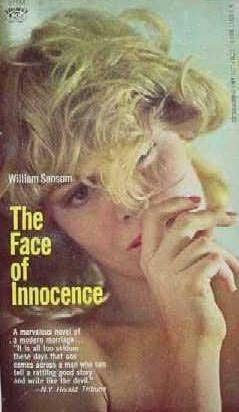 Walston, gave him a copy of The Face of Innocence by William Sansom (1912 –1976) "because there is nothing else to give you". Not sure what to make of that remark. Sansom is a writer whom I’d not come across before, and so picking this book up at random I had no idea what to expect. Later, I discovered that there is very little about him on the Internet, although in his day he was highly regarded by other writers such as Eudora Welty, Henry Green and Graham Greene himself. I think he’s what it described as ‘a writers’ writer’, with a very conscious use of language, sometimes a little too clever and self-regarding, which can be a distraction to the reader. His obvious enjoyment of language leads him sometimes to make up his own verbs, which makes him quite fun to read.
Walston, gave him a copy of The Face of Innocence by William Sansom (1912 –1976) "because there is nothing else to give you". Not sure what to make of that remark. Sansom is a writer whom I’d not come across before, and so picking this book up at random I had no idea what to expect. Later, I discovered that there is very little about him on the Internet, although in his day he was highly regarded by other writers such as Eudora Welty, Henry Green and Graham Greene himself. I think he’s what it described as ‘a writers’ writer’, with a very conscious use of language, sometimes a little too clever and self-regarding, which can be a distraction to the reader. His obvious enjoyment of language leads him sometimes to make up his own verbs, which makes him quite fun to read.
The plot revolves round the relationship of two men with a woman called, portentously, Eve. She marries and deceives one of them, while using the other one, who is infatuated with her, as her confident. The big question implied in the ironical title is: whose is the face of innocence? Not Eve, surely, who is highly manipulative and whose motives ultimately remain dark. In fact, her character, central to the whole narrative, is problematical – I was never really convinced by her.
During World War II, Sansom, like Henry Green, was a fireman with the National Fire Service, combatting infernos created by German bombing attacks on England – in fact he may have been a colleague in the service. This experience became one of the major themes of his early works, such as Fireman Flower, and Other Stories. His descriptions of London and London life, in novels and stories set there, became one of the hallmarks of his work.
There’s a good review here:
http://myweb.tiscali.co.uk/christopherpriest/sanrev.htm
Posted by
Celia
at
17:26
0
comments
![]()
Labels: Books
Saturday, 2 June 2007
Holiday Reading 2:Rumer Godden
 Why, I wondered, had I never read Kingfishers Catch Fire? Still it was good to have such a treat in reserve. The other books of Godden's which I've read - and she wrote 60 all told - are The River and Black Narcissus, both of which were made into films. (I saw the latter when it came out in 1947, when I was ten years old - taken to the cinema by my father - and can remember the colours and atmosphere of it to this day.)
Why, I wondered, had I never read Kingfishers Catch Fire? Still it was good to have such a treat in reserve. The other books of Godden's which I've read - and she wrote 60 all told - are The River and Black Narcissus, both of which were made into films. (I saw the latter when it came out in 1947, when I was ten years old - taken to the cinema by my father - and can remember the colours and atmosphere of it to this day.)
Kingfishers Catch Fire, published in 1953, is a fictionalised acount of the period she spent living frugally in a cottage in Kashmir; she depicts herself as a free spirit who for various reasons is hard up, but in real life she was grimly trying to write to earn money in order to repay the debts which accrued in the collapse of her marriage.
The story gives a convincing picture of the way of life and characters of a particular place and time, without in any way glamourising them or presenting an 'idyll' - although only a Kashmiri would be able to tell us how 'true' it is!
During her time in Kashmir, as well as writing books, Godden set up, and taught in, a school and practised herbal medicine. The family survived an apparent poisoning attempt by two servants, all of which is incorporated into the novel.
Posted by
Celia
at
20:04
0
comments
![]()
Labels: Books



